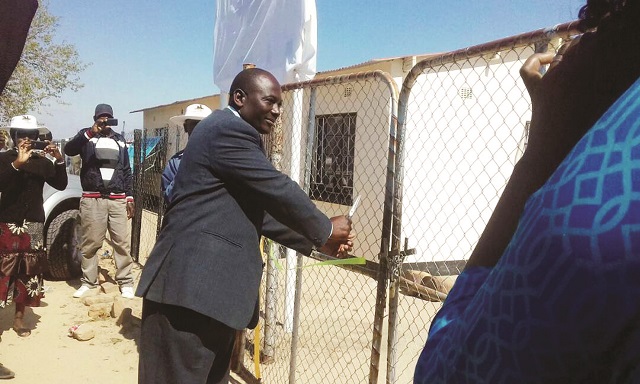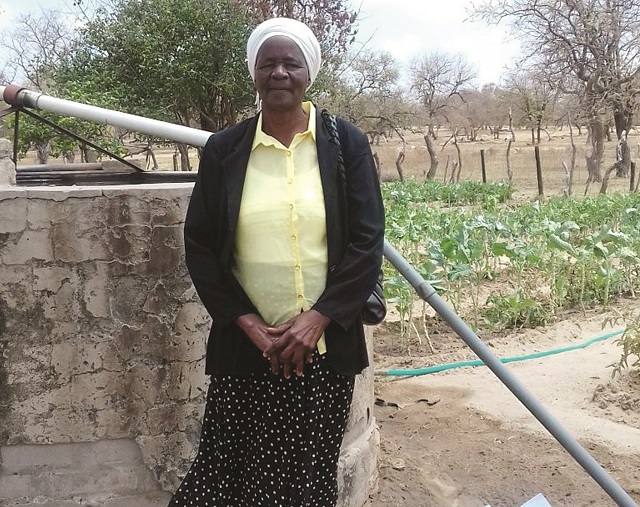Dabane Trust lessens rural women’s burden

Pamenus Tuso
FOR the past couple of years, Ms Rosena Kgwatala (64) of Tshelanyemba Village in Maphisa District, Matabeleland South province starts her day every morning by manually pumping water from the Shashane dry river bed and waters her garden which is her only source of survival.
Ms Kgwatala’s strenuous daily routine is also similar to several other members of the various community gardens located along Shashane river in this arid area.
After the realisation that the Matabeleland region continues to suffer chronic water shortages as a result of erratic rainfall (although there is plenty underground water from seasonal rivers), a local independent organisation, Dabane Trust, in 2010 introduced simple and low cost water abstraction equipment to the community garden members which are mostly run by women.
Two of the most common, simple and cost effective water pumps which have been designed by Dabane engineers are the Rowa and Joma hand pumps.
The Rowa pumps basically provide clean and fresh water for drinking purposes while Joma provides water for irrigation purposes. Well points are driven into the water-saturated sand of the deeper parts of the river bed. The well points are then connected to the hand pumps on the riverbank, ensuring an installation which may be used safely all year round and will not be damaged by floods when the river next flows.
This technology ensures that people are able to abstract greater amounts of clean water all year round with no detrimental effects to the environment.
The Joma pump provides water for approximately a half hectare garden as well as for livestock.
Although the inception of this technology lessened the rural women’s traditional burden of physically fetching water from the river and water their gardens, the manual pumps have limitations which impact negatively on production.
“Before the introduction of Joma pumps by Dabane, we used to literally scavenge for water in dry river beds and irrigate our gardens as well as water our animals. The advent of the Joma pumps to a larger extent changed our lives as production in our gardens increased. As a result of this increased production, we now produce adequate food for our families,” said Ms Kgwatala, who is the chairperson of the thriving Thembani community garden.
Ms Kgwatala said although the hand pumps had brought joy and relief to the gardeners who are mostly women and girls, they continued to carry the tedious and physical burden of manually using the pumps.
However, Ms Kgwatala and other gardeners’ woes have been eased following the introduction of solar powered water abstraction equipment by Dabane.
“The low cost simple hand pump systems which we have designed have been very efficient and easy to operate but we have decided to migrate to a solar powered system after realising the old technology had some challenges in achieving maximum production. For example, with the rollers it used to take about three and half hours to fill a 7 000 litre tank,” said Dabane Trust director, Mr Stephen Hussey.
The solar powered pumping machines cost between $500 and $1 000, depending on the size.
“The only components of this project which are expensive are the solar panels and fencing. Otherwise when installed, the equipment needs minor maintenance and no other expenses are involved,” he said.
Mr Hussey said the migration from the old system to the solar technology had enabled maximum production of organic fresh, nutritious vegetable and protein food crops for both subsistence and commercial consumption.
As a result of increased production following the installation of the solar pumps, Mr Hussey said the community, with the support of his organisation and Trocaire, had managed to establish the Matobo Food Processing and Value Addition Centre.
He said the centre, which is located at Tshelanyemba Centre in Matobo, had managed to increase food security and mitigate climate change shock for 600 direct beneficiaries and 3 300 indirect beneficiaries in the district.
A committee member of the Toloki community garden, Ms Cola Nyathi, hailed both Trocaire and Dabane for assisting farmers with the solar irrigation technology and the value addition centre.
The Matobo Food Processing and Value Addition Centre project was initiated in 2014 by the local community before Trocaire through Dabane Trust chipped in with both technical and financial assistance under the livelihoods programme. A total of $66 000 was invested in the centre through the purchase of building materials, furniture, equipment, training, supervision as well as labour costs.
“With this processing centre, we are now able to increase the value of our crops by processing and packaging, thus yielding returns. Before the establishment of the centre, a lot of our garden produce used to rot because we did not have the capacity to add value to our goods. We are no longer depending on our husbands for our everyday needs and those of our families. Some of us are now owners of livestock, courtesy of this project,” said Ms Nyathi.
The vice chairperson of Madlelo-aluhlaza garden, Ms Tedious Dube, also gave a similar testimony saying the project had brought joy to many households and institutions which are supported by produce from the gardens.
“Before the inception of this project, most women were restricted to household chores. The living standards of most widows and child-headed families have tremendously changed. Most of the families in the area used to have either a single meal or even none per day but now they can enjoy three meals because of this garden project,” said Ms Dube.
The vice chairperson said some of the community gardens were supplying patients at the local Tshelanyemba Hospital with fresh nutritious garden produce such as beetroot, carrots and tomatoes among others.
Trocaire programmes manager, Ms Beatrice Ndhlovu, said the food processing and value addition centre has resulted in more women actively participating in decision making processes.
“We have seen the growth of women’s participation in other community structures. For example, some female members of the processing centre and the gardens now hold influential positions in school development committees as well as other community structures. So for us, what is important is for the women to gain confidence and go beyond projects and start participating actively in community life,” said Ms Ndhlovu.
She said her organisation would continue to train the women on conservation farming and how to effectively market their products.
“Beyond the ordinary farming practice, we are teaching them new techniques in farming which we know will result not only in higher yields but will ensure that the food they are growing is healthy.
“We are also assisting farmers with outside market linkages so that they are able to get cash and pay school fees for their children,” said Ms Ndhlovu.
The processing centre has already started processing sorghum meal, traditional fruit juices, jam, tomatoes, dried vegetables and okra among other products.
“Our challenge now is to work more with the gardeners and increase production. We need also to improve the quality of the soil by removing rubbish soil and put a bit of fertiliser to it. Now that the system is fully functional, we need to increase production,” said Mr Hussey.
He said now that more water is available, his organisation and farmers are considering increasing the size of the gardens.
Mr Hussey said as part of climate change mitigation measures in the region, Dabane Trust is also working with students from various universities on a research project to determine the amount of water available in seasonal rivers.
“We need to have systems which manage climate change. Climate change is real and we need to look at ways of improving or reducing the loss of water and moisture from dry land crops. There is a lot of clean water in dry river beds,” said Mr Hussey.
Using similar technology, Dabane has also installed a water supply system at Tshelanyemba Hospital.
Dabane Trust in partnership with SNV and Practical Action is also working on a 160 hectare irrigation scheme on the confluence of Tuli and Shashane rivers at Mashava in the Midlands province. The organisation is providing technical assistance on sand water abstraction through the solar powered equipment.
Currently, the centre has 57 members (49 women and eight men) who have been trained in participatory Market Systems Development (PMSD), Community Based Management (CBM) as well as Business Model and Ownership Management (BMOM).
Dabane Trust in collaboration with the Ministry of Women Affairs, Gender and Community Development has also conducted gender awareness workshops that target both men and women.
Officially opening the centre last week on behalf of Small to Medium Enterprises and Cooperative Development Minister Sithembiso Nyoni, Matabeleland South deputy director in the ministry, Mr Richmond Ncube, applauded the local community for championing the project, which he said was in line with the government’s Zim-Asset programme and the United Nations’ Sustainable Development Goal 2, which aims to end hunger, achieve food security and improve nutrition and promote sustainable agriculture.
“The objectives of the centre speak to Chapter One Section 15 (A) and (B) of the Constitution of Zimbabwe that seeks to address food security and to Zim-Asset’s food security and nutrition as well as the value addition and beneficiation clusters.
“Therefore, the centre seeks to achieve food security and income for community members through agro-based processing and value-addition,” said Mr Ncube.











Comments